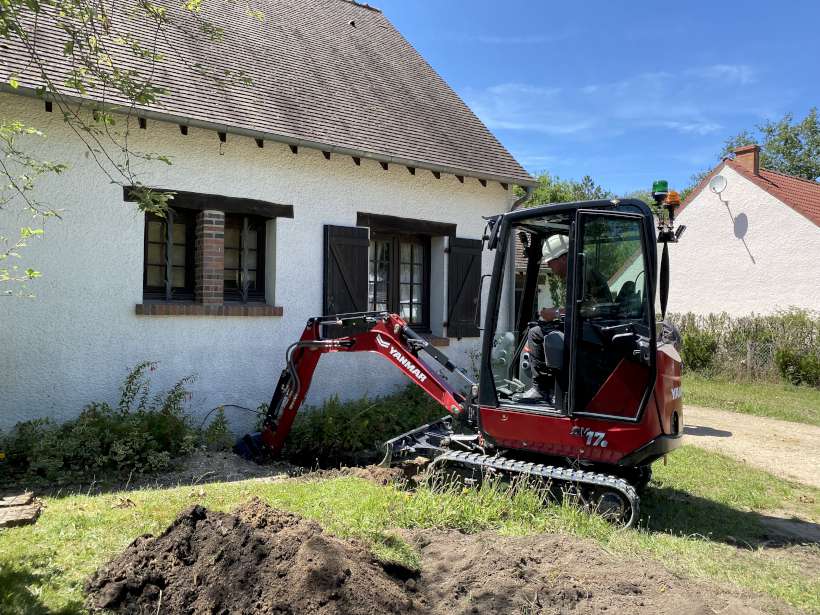The transition from the internal combustion (compression) engine to electric power will not happen overnight, but momentum is building and the EMEA region is leading the way, believes Yanmar CE’s Cédric Durand.
Diesel Engine Innovators
Considering that Yanmar is famous for inventing the small diesel engine in 1933, it may surprise some that the company is at the forefront of trying to replace it. Yanmar Compact Equipment (CE) will start European deliveries this year of its first zero-emissions mini excavator – the SV17e, and all-new V8e compact wheel loader. But this is no contradiction: Yanmar’s founder Yamaoka Magokichi saw the diesel engine as a means to an end – improving society. In those days the small diesel engine transformed the lives of farmers in Japan. Today, with emissions from combustion engines impacting the climate, it is clear that to improve society a new solution is needed. That solution is embracing electric power.
The launch of the SV17e and V8e are important strategic steps in Yanmar CE’s future transformation. Delivering 23.5 kWh and 40kWh battery capacity respectively (and with a 52kWh option), these electric machines are capable, powerful and highly productive – while always meeting the world’s most demanding emissions restrictions.
A new way of working
As good as the SV17e and V8e are, it and the new generation of electric machines are struggling to gain traction. Electric technology is new, and customers are hesitant to make such a big change. The purchase price of electric machines – due to high component prices – is more than comparable ICE machines – and that’s not all. The charging infrastructure is still in its infancy, new machines require a different way of working for customers, and residual values are unknown. But despite the challenges, this industry is going electric – and this shift will happen in Europe first.
“It’s not going to be easy, but by 2050 we plan to be net zero emissions,” says Cédric Durand, Director Product Management EMEA at Yanmar CE. “Not just Yanmar, but also Yanmar customers. We have a roadmap to make that happen – and electrification is at the heart of it.”
Before joining Yanmar three years ago Cédric Durand spent 15 years working for dealers across Europe and in North Africa. He knows customers and is not daunted at the scale of the challenge the industry faces in becoming sustainable. Thankfully, things are starting to move.
Growing interest in Europe
“Customers and countries are becoming interested – and that’s an important first step,” he says. “Large rental companies are dipping their toes in the market, and several big contractors with ESG targets are keen. Scandinavia and the Nordics are leading the field for zero emissions, especially Norway, but these are still small markets. For volumes to really grow – and economies-of-scale to drive down costs – we need a major European economy like Germany, France or the UK to push for electrification. We are not seeing that yet. But when it happens, we believe it will go fast – and we need to have a range of electric machines ready.”
Tougher environmental legislation and ultra-low (and zero) emission zones in urban areas will play a part in accelerating the shift to electric. So too will cost of ownership. It costs far less to charge a machine using electricity than it does to fill one with diesel, and with fewer service parts (oil, oil filter etc), this combination could well mean electric machines have a total cost of ownership that is less than diesel – even with the higher initial purchase price.
Robust technology
Another concern is battery life – how long until they need replacing? “On the products we are launching this year, the lifetime of the batteries will be at least equivalent to the lifetime expected of a diesel machine,” says Durand. “We are also devising ways to reuse those end-of-life batteries so that they contribute to the circular economy.”
Yanmar CE is working closely with its dealers to ensure customers of electric machines get the same excellent service they are accustomed to.
“Putting the sustainability issue to one side, electrification is the right way forward in terms of performance, operator comfort and economy,” continues Durand. “We put customers at the heart of everything we do, and at the very least we are aiming for our first-gen electric machines to be easy to use and have similar performance as our equivalent diesel powered equipment.”
Far from being intimidated at the scale of his task, Cédric Durand is more than up for it. “There hasn’t been a change this big in the last 50 years, he says. “It will involve us all adapting and making compromises, but electrification is going to happen. It’s good for the climate and good for business – it’s an exciting prospect.”

